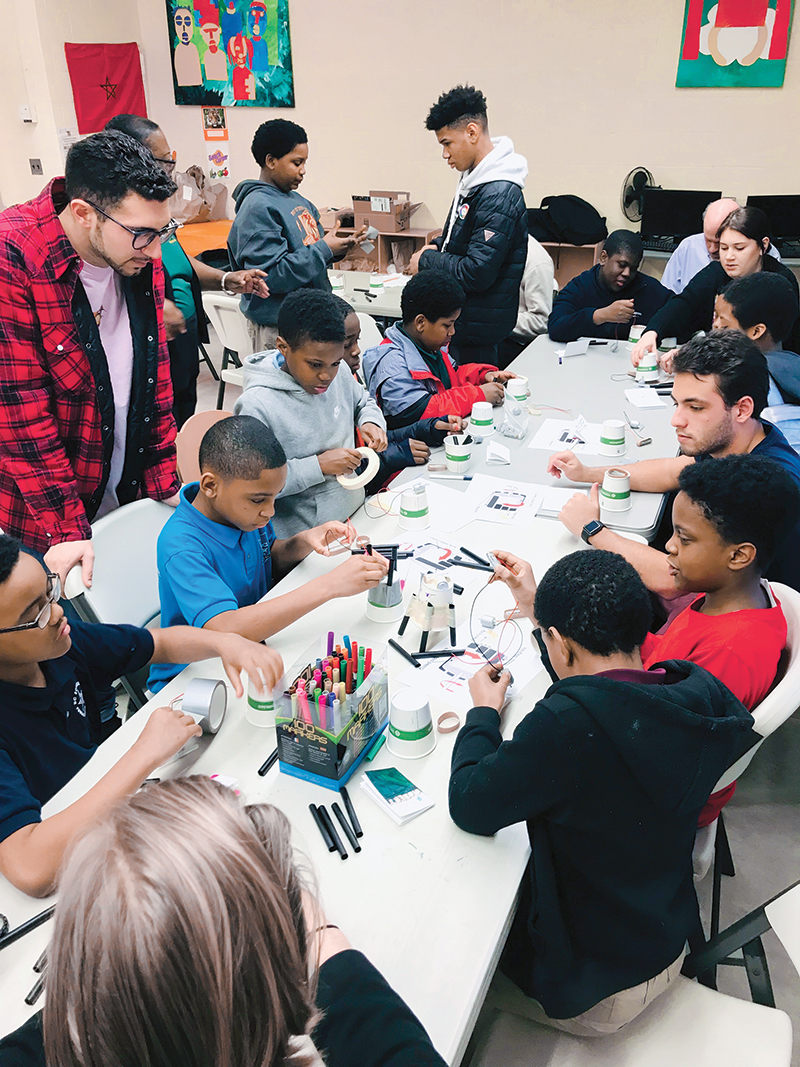I CAN Science: Hands-On Lessons Encourage Scientific Curiosity
I CAN Science: Hands-On Lessons Encourage Scientific Curiosity
2018–19 SPS Future Faces of Physics Award
Project Lead: Jason Starita
Project Advisor: Gary White
Project Summary: I CAN Science is an outreach collaboration between The George Washington University’s SPS chapter and the Life Pieces to Masterpieces afterschool program. Aimed at young African American boys, the program promotes hands-on physics learning through demonstrations.
“Physics Is Everywhere”
For 36 African American boys at Drew Elementary School in Washington, DC, the theme of our I CAN Science program became clearer with each lesson they received over the course of the 2019 Spring semester.
The students, ages seven to twelve, were participants in the Life Pieces to Masterpieces afterschool program hosted by Drew Elementary. In partnership with the program, members of The George Washington University’s SPS chapter made seven trips to the school to inspire scientific curiosity in students. By helping our youth feel included in STEM—first by acknowledging cultural differences, then by empowering students with the resources to explore their budding scientific questions—we hope to enhance their interest in physics, now and in the future.
Each lesson focused on one or two buzzwords—physics, astronomy, motors and vehicles, motion and rotation, fluid, light, and phase change—and included two to four interactive lab stations overseen by SPS members and our adviser. In keeping with our theme, the activities revealed that physics is everywhere in our daily lives.
Concepts demonstrated at each station varied depending on age. During the lesson on vehicles, for example, younger students learned about lift versus gravity by making, testing, and revising paper airplane designs. Older students learned about the functions of motors by making simple robots.
Each lesson was designed to allow students to learn about different physical concepts in a hands-on environment. To keep the material engaging and accessible, we deemphasized the complicated mathematics driving these ideas. Lessons concluded with time for students to reflect on what they’d learned, share exciting new facts—“Saturn’s rings are really just tiny rocks around the planet”—and possibly hear something they may have missed, giving them the opportunity to engage like scientists in a collaborative community.
Students were able to expand upon their understanding of each week’s topic using the ideas and concepts they learned in previous weeks or while in school. They also had access to our portable science station, which allowed them to take home items like diffraction glasses and Slinkys. This helped students feel more connected to the topics they learned about and more eager to share their scientific experiences with peers, family, and other mentors.
Our SPS chapter has worked with Life Pieces to Masterpieces for the past five years. We intend to continue our relationship with the program, both to support the growth of scientific curiosity among students and to give SPS members hands-on teaching experiences. By fostering this relationship, we’re proud to support this multifaceted program that aims to develop character, self-reliance, and integrity in young African American men while fostering mentorship relationships with positive role models.
By engaging these students with physics demonstrations, we seek to invoke a passion for science that inspires them to pursue physics and other STEM fields. In turn, we hope this work ultimately results in greater diversity in the scientific community. With a wider range of backgrounds and outlooks, we gain new perspectives and benefit from individual ideas and experiences. The students in this program are the future of our scientific communities.

For more details on this project, visit our SPS award page at spsnational.org/awards/future-faces-physics-award/2019/george-washington-university.
